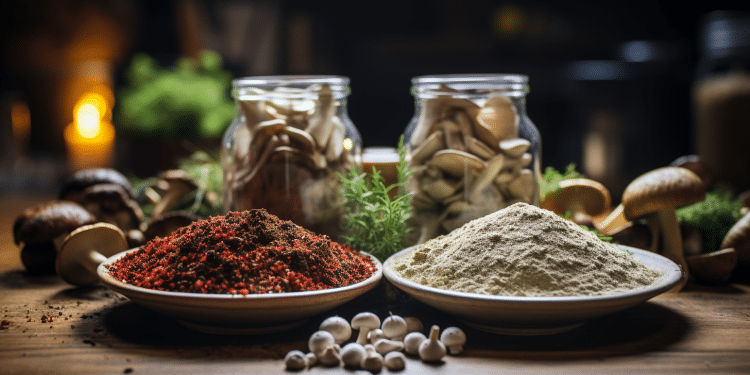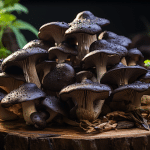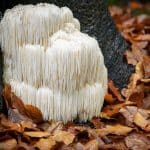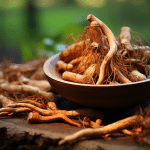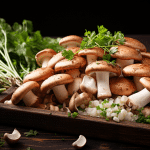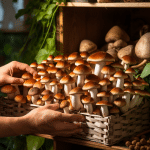If you are reading this, chances are it is because you are curious about taking mushroom-based supplements, and you may have discovered two of the most popular types of mushroom supplements: mushroom powders and tinctures.
This article is to help you understand the differences between them, and which you should be taking for the best benefits possible – be that for nutrient reasons, or because you are looking to adopt adaptogens into your lifestyle. First, let us cover exactly what is a mushroom powder and a mushroom tincture, how they are processed, and what is different between the two.
What is Mushroom Powder?
Powder may consist only of the dried, crushed, mushroom fruiting body, which is trimmed from its base, or of an entire mushroom, which has been removed from its substrate (although some species of mushrooms with smaller fruiting bodies may include the entire substrate).
All ingredients within the mushroom, along with the fibers in the mushrooms, are preserved relatively undisturbed, given the drying process occurs at a temperate temperature (below 40degC). Because more ingredients of the mushroom survive in the processing of this manner, powders have a wider range of health benefits.
However, they retain almost all their nutrients, this really makes powders useful for people who are looking to consume mushrooms for nutrient reasons, like vegans who want to ensure that they are getting a good source of protein and B vitamins in their diet. Caution is needed however, when taking powders of some mushrooms, because the drying process may leave behind higher amounts of some toxins which, although not harmful at low doses, may be detrimental at higher amounts, or may accumulate in the body. This is true of only certain subsets of mushrooms however, usually the rarer, higher-priced ones like the cordyceps mushrooms, and powders made from the more common, edible varieties should be no worry.
What is a Mushroom Tincture or Extract?
A mushroom tincture is the liquide extract of any particular mushroom. Typically this is done via a dual extraction process, where the beneficial compounds and nutrients are extracted from the mushroom into a base liquid. This allows someone to add this extracted liquid into their coffee, water, or even just drinking it on it’s own, and getting a very concentrated liquid dose of a particular mushroom to receive all of the health benefits.
The primary attractions and advantages of extracts are twofold: better control of what elements are left in the end product, and a very high beta-glucan yield. Beta-Glucans can be as much as 15 times more concentrated in tinctures depending on the type of mushrooms being extracted, when compared with powder.
This is because the extracts undergo prolonged cooking, which depending on cooking method and mushrooms, causes some substances (and particularly the beta-glucans) to be released from the cell matrix, and thus are far more accessible and easier to absorb via digestion. While this different process for processing causes some content to be lost (including many vitamins and minerals), the primary goal is for others, like fungal polysaccharides, to be highly concentrated instead, as well as any other compounds in the mushroom that might have potential benefits.
Learn more: Mushroom substrate
This does also mean extracts are generally given in lower doses than powders, since their elements are so extremely concentrated in comparison. Extracts may also be safer to consume (as long as extracts are done correctly, so make sure that whatever extracts you do consume are from reputable/reliable sources) than powders generally are, because many of the cytotoxic compounds, as well as the other minor toxins some mushrooms may contain, are typically eliminated and/or destroyed in the process.
Mushroom Tincture vs Powder
If you are looking to maximize the quantity of beta-glucans that you are taking, there is no question that tinctures are the way to go. As we have discussed before, tinctures have up to 15 times the beta-glucans in a powder, and they are far easier to absorb because they are no longer bound up with the rest of the mushrooms. Extracts typically also contain very high amounts of new antioxidants than powders, which helps fight off the adverse effects of oxidative stressors (the main reason for increased cellular ageing).
Another major reason why you might choose to opt for a tincture instead of a powder is that extracts have fewer impurities, which is important if you are choosing to consume a mushroom supplement for a specific effect, adaptogenic or otherwise. On the other hand, depending on the type of mushroom and manufacturer, powders may also frequently contain a higher number of fillers that do not provide any benefits.
This is because the primary filler used, usually made of barley rye or rice, is a difficult-to-separate mushroom growth medium, and is usually too exhausted to keep growing any more mushrooms, and, in some cases, mushrooms cannot be harvested and powdered without including this, because fruiting bodies are too small to efficiently be removed separately from mycelium, which is attached to itself across the entire growth medium. High-quality powders made with mushrooms that have larger fruiting bodies, however, usually do not include the filler, since harvesting just the fruiting bodies is easier, and manufacturers simply add new, fresh growth media to it, to maintain current mycelium so it can continue to grow more mushrooms. So at this point, you might ask, “why are the fillers so bad, if they are still mycelium?” Well, the truth is that is not necessarily a bad thing on its own.
Mycelium is often figured alongside the total mushroom fruiting body amount that you are getting out of your powder, though they are not exactly the same. The burden on pills/doses increases because you need to take a lot of pills or lots of powder to achieve your desired benefits. The mycelium does not contain the majority of nutrients in mushrooms, and is much less studied and understood with respect to potential health benefits than the mushroom fruiting bodies.
So does this mean that you should always choose the extracts instead of powders, then? Powders do indeed contain more nutrients than extracts because they are minimally processed, and if you are simply looking for a good vegan source of B vitamins and protein, powders may be your friend (unless you actually like eating mushrooms anyway, in which case you could simply incorporate them into your diet minimally prepared in anyway).
They may even contain a wider array of useful compounds that are probably eliminated in extracts, though that is only conjecture, as those will be compounds still yet to be studied/discovered by researchers. They would also be very low amounts, and could, at best, only provide slight adaptogenic benefits, if any.
The Beta-Glucans of Mushrooms
Beta-Glucans are complex sugars (polysaccharides) found in cell walls of a variety of single-cellular and multicellular organisms, such as mushrooms, yeasts, seaweeds, and grains. Although beta-glucans are found in all of these sources, their physical and chemical properties differ widely depending on the source. Generally, beta-glucans, like the ones found in grains, aid in cholesterol reduction by binding with cholesterol in the digestive tract. However, the beta-glucans found in mushrooms produce different effects when taken because of a differing, shorter branching structure in their chemical makeup. They are not soluble in water, unlike those that come from grains, and so they are generally actually metabolized by the body.
Learn more: Mushrooms for stress
This is an important distinction, because some evidence suggests that, once metabolized by the body, they enhance immune function, increasing the responsiveness of macrophages and their vigilance.
Overall, extracts are generally better than powders when it comes to taking mushrooms supplements to get specific desired effects, since powders usually contain too few compounds readily available to your metabolism for easy absorption. This is particularly the case if you are looking to take mushrooms supplements with the explicit intent of getting as much of a mushrooms beta-glucans as possible. Powders are best used if you are on a mostly plant-based diet, since they will add nutrients that are harder to get from other vegetables and fruits. You can certainly get the benefits of both by taking supplements that have both extracts and powders blended together, which is actually what a broad variety of manufacturers are doing.
Updated 10/3/2022
